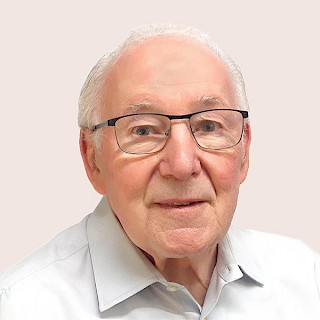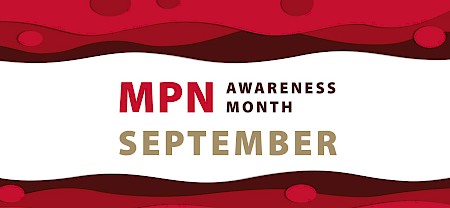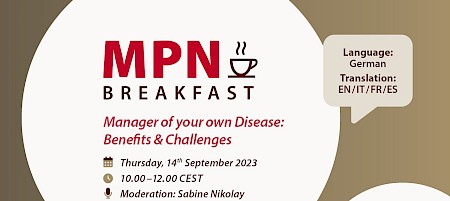Living with MPN
Personal stories of patients, their specific needs and new therapy options
Checklist and Tips
MPN & Family Planning

I have lived with polycythemia vera for almost 30 years. Despite everything, I have not given up or been defeated by the disease. Instead, I have decided to turn my experience into an opportunity to help other patients with polycythemia vera or other myeloproliferative neoplasms (MPN).
Learn more
What needs to be improved?
Myeloproliferative neoplasms (MPNs) are typically diagnosed later in adulthood, but some patients present it at a younger age – at a time where they might be thinking about starting a family. What can be helpful and could be improved?
- Clear information from healthcare professionals to patients and their families about MPN diseases, treatment options, life expectancy and changes in everyday life.
- Connecting with other families that face the same situation in form of webinars, round tables, congresses, forums etc.
- Psychological support
- Cooperation and alignment of haemato-oncologists and gynecologists. A coordinated care plan between the treating haemato-oncologist and gynecologist helps to ensure the health of the mother during the course of her pregnancy and the birth of the child.
What was your way to the diagnosis?
"In 2009, I had a very stressful period in my life with an intensive work schedule and studying at the university at the same time. I often felt very exhausted but just put it down to being so busy and having to juggle so many tasks. But then blood tests revealed something more sinister than tiredness. After the bone marrow biopsy, the diagnosis was clear – Essential Thrombocythemia (ET). Years later it has developed to myelofibrosis (MF)."
How has it impacted your family planning?
"It is hard to make plans as an MF patient, but my partner and I have decided that we want to try to become parents. I very much hope that with the strong support and close cooperation between my haemato-oncologist and gynecologist, I will be able to become a mother.
What was the biggest hurdle?
"To me one of the most difficult things was to talk to my family about the disease. They think that I have PV, I couldn’t tell them that it has transformed to MF. I am the only child in the family, and it would destroy them to know. They think I’m fine. I don’t want to make them worry. When you live with the disease it is overwhelming and you are reminded of it every single day. Making plans is difficult."
What was helpful & what gives you strength?
"Regular conversations with a psychologist help enormously. Talking with the people closest to you - family, friends, colleagues - is also a relief. They know, at least partially, what I am going through and are understanding and show support."
What was your way to the diagnosis?
"During my second pregnancy, I had very strong headaches. I asked my doctor what was going on, but he only prescribed me painkillers. At the same time my father was dying from cancer which was a very difficult period in my life. Everybody was explaining my condition with a lot of stress and grief. On the day I gave birth to my second son my condition became unbearable. My headache and insomnia were so strong. My instinct was that the symptoms had nothing to do with giving birth. In my case, I always had Myelofibrosis, it was never Essential Thrombocythemia but I was misdiagnosed from the beginning. It was only two years later, when the doctors ordered the correct tests, that they discovered that it was Primary Myelofibrosis, it was not a progression from the other disease (Secondary myelofibrosis). It was very hard to deal with this news having two little children."
How has it impacted your family planning?
"My whole life I was very healthy with no complaints, symptoms etc. I gave birth to my second son while already having MF but not being aware of it. Now, as a mother of two wonderful boys age 5 and 2, I do my best to be a good mother for them, despite all the everyday difficulties. My family is what’s most important to me and I appreciate every moment we spend together."
What was the biggest hurdle?
"I became mother without knowing that I had the disease. My current situation forces me to confront the question of my life expectancy. Am I going to see my children grow up? This is probably the hardest part for me emotionally. And in everyday life, it is hard to keep going, finding the right doctor I can trust, continuing with treatments and regular checks and dealing with symptoms."
What was helpful & what gives you strength?
"I have two little children and they deserve a good life and a caring mother. That thought gives me strength. I try to feel good even if I don’t feel well. Having time together with beloved ones, going to the mountains, taking care of our animals, and appreciating every moment we have together. I also believe that sharing experiences with other families is very important. We are all facing the same difficulties and talking about these, sharing our worries, dreams, experiences give strength."
What was your way to the diagnosis?
"At 17, I got the diagnosis of an acute promyelocytic leukemia (APL). The treatment went well but during my post-rehabilitation tests the doctors found out that my thrombocyte levels were way too high. After numerous checks it was clear that I have Essential Thrombocythemia (ET)."
How has it impacted your family planning?
"After moving in into our new house and renovating it ourselves, we very much wanted to become parents and start our own family. Unfortunately, this coincided with my ET diagnosis, and no one was able to explain to me exactly what it meant and how my life was going to change. After a very long search, we found a doctor who explained the disease in detail and how to treat it. He also encouraged us to try to have a baby. A week later after visiting him we discovered that I was pregnant. Our daughter is eighteen months old now and we very much want her to have a sibling!"
What was the biggest hurdle?
"Frankly speaking, me and my partner were in a total panic to begin with because no one could tell us what this disease meant, which therapy was appropriate etc. The only answer was to “wait and see”. Psychologically it was very difficult to cope with this uncertainty. The diagnosis was very overwhelming for me since we had just moved into a new home and wanted to start our family."
What was helpful & what gives you strength?
"Interaction with the patient support group was very helpful with all the information they provided! But my partner was and is the one who supported and supports me the most. His constant companionship, care, and love were enormously important. He is really my biggest treasure. I also especially appreciate everything my doctors have done for me during my pregnancy and the birth of our daughter!"
What was your way to the diagnosis?
"I could not go jogging. After a couple of minutes, I felt pain in my abdominal area. After tests it was clear that my spleen is too big - 22cm - and that I have Essential Thromobcythemia (ET). I had no therapy just a “wait and watch” approach. Sometime later I had to run to catch the train and I felt so bad that people had to call a doctor. I was between living and dying for some time. The blood tests showed that it had developed into myelofibrosis (MF)."
How has it impacted your family planning?
"My haemato-oncologist warned me about all possible difficulties, but I want to try to become a mother. My partner and I have found a hospital where I can be under the observation of haemato-oncologists and gynecologists. Taking one step at a time and being open to all possible solution is what we do now."
What is the biggest hurdle?
"I had a feeling that there was no clear line regarding MPN treatments. Diverging information and different approaches came from various doctors and sometimes those were contradicting. No psychological support was also very hard, as well as explaining the disease to my family and friends. It was very difficult for them to accept my diagnosis."
What was helpful & what gives you strength?
"Patient organization support was fantastic. They gave me so much. I listened to other stories, to other women and men and that gave me strength and gave me the feeling that I am not alone. My partner was my strongest supporter, and it became even easier when he joined the Facebook forums and participates in webinars with me."
Young Patients Talks
Perspectives and hopes for the future from young patients living with an MPN

MPN is mainly a disease of elderly patients and the research is mostly dedicated to this group of patients. Not yet to younger patients.
Dr. Sobas, PhD, Wroclaw Medical University
Related links to MPN patient organizations
- Austria: MPN Austria Selbsthilfegruppe
- Germany: MPN Netzwerk
- Spain: MPN - Espana
- Switzerland: HOPOS
- France: Vive avec une NMP
- Italy: AIPAMM
- Netherlands: MPN Stichting
- United Kingdom: MPN Voice UK
- Global: Global MPN Scientific Foundation

Der September ist das Monat der Aufklärung über MPN.
In diesem Rahmen finden zahlreiche Veranstaltungen und Aktivitäten statt, die darauf abzielen, das Bewusstsein für MPN zu schärfen und die Überzeugung zu fördern, dass es für das Wohlbefinden der Patienten von entscheidender Bedeutung ist, die Betroffenen zu informieren, mit ihnen in Kontakt zu treten und sich für sie einzusetzen.

Webcast MPN Breakfast 2023
Watch the webcast!
On the occasion of the 11th Annual MPN Awareness Day, we are pleased to invite you to our traditional MPN Breakfast - a panel discussion with patient advocates, health care professionals and industry representatives, focusing on the topic “Manager of your own disease – benefits & challenges”.
Live-Stream – simultaneous translation from German into English, Spanish and Italian
Click here to see the webcast!
My MPN Diary
My MPN Diary is a diary and companion tool for patients with myeloproliferative neoplasms (MPNs). Documenting and tracking your MPN disease can give you new detailed insights about your disease.

